
Will Canada’s next prime minister support Indigenous Rights and conservation projects?
The Conservative and Liberal parties diverge sharply on Indigenous issues. Here’s what that could mean...
RCMP officers are enforcing a Coastal GasLink injunction, arresting Wet’suwet’en land defenders and supporters Thursday, days after they took control of a forest service road and ordered pipeline workers to leave Gidimt’en territory in northwest B.C.
In a video update published to Twitter, Sleydo’ Molly Wickham, Gidimt’en Camp spokesperson, said RCMP moved into the territory and started arresting land defenders at the Gidimt’en Checkpoint.
“Our warriors are down there, our matriarch is there,” she said, noting the RCMP is using canine units to assist with arrests. “There’s a lot of people that are there that are at risk of this police violence.”
According to a Gidimt’en update posted at 12:48 p.m. on Nov. 18, approximately 15 arrests have been made, including Elders, legal observers and media.
“We were hoping that a solution would be reached without the need for police enforcement, however, it has become very clear to us that our discretionary period has come to an end and the RCMP must now enforce the orders given by the B.C. Supreme Court on December 31, 2019,” John Brewer, Chief Superintendent of the RCMP’s Community-Industry Response Group, said in a statement.
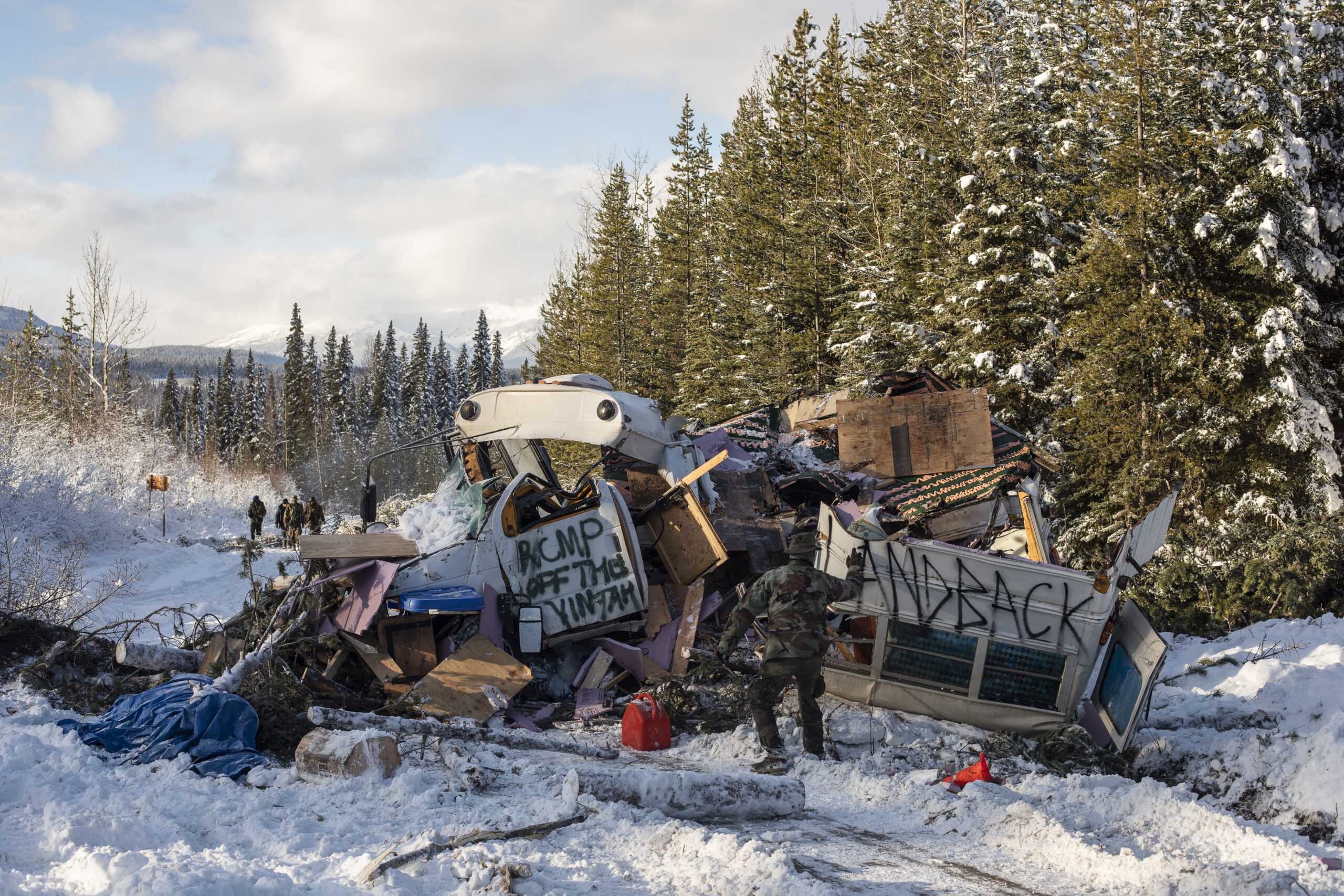
Hereditary Dinï ze’ (Chief) Woos, Frank Alec, expressed regret that workers are stuck in the camps behind the blockades.
“I want to mention to our local non-Wet’suwet’en members that we’re sorry you ended up in the middle of this,” he said in a video statement. “But I must say that we gave ample notice to [Coastal GasLink] that we were going to act on this.”
Workers were given eight hours on Sunday to evacuate and Chief Woos granted a two hour extension, but of the estimated 500 individuals housed at Coastal GasLink’s two remote work camps, only a handful left.
The 670-kilometre Coastal GasLink pipeline, owned by TC Energy, would connect natural gas producers in the province’s northeast with the LNG Canada facility currently under construction in Kitimat.
Coastal GasLink did not answer The Narwhal’s questions about whether the company had informed its workers of the evacuation order, instead noting in an email, “We will not jeopardize the safety of our workers, under any circumstance.”
According to a Tyee report, many workers were not told about the evacuation order.
“I don’t know about everybody, but a lot said they would have left,” one worker, who asked not to be named for fear of losing their job, told The Tyee.
On Nov. 16, RCMP units set up an exclusion zone 10 kilometres from where Wet’suwet’en land defenders and supporters closed the road. The following day, Jennifer Wickham, a Wet’suwet’en community member and media liaison for Gidimt’en Camp, was transporting heart medicine to an Elder who is behind the blockades. RCMP officers denied Wickham access to the territory.
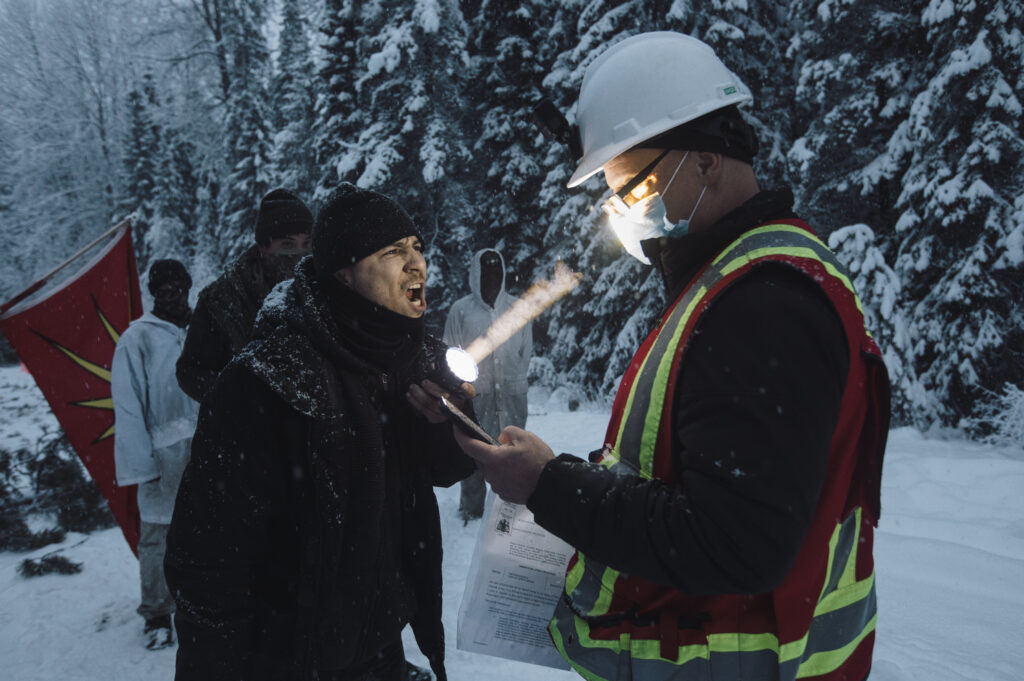
“When the roads were closed by enforcing our eviction notice to [Coastal GasLink] that we delivered back on Jan. 4, 2020, we were contacted by some of the B.C. representatives and all they did was lecture us and reiterated the safety issue of the people at the camp regarding their food supplies,” Woos explained in the statement. “Now in talking about safety issues, the RCMP is currently blocking kilometre 29 and not allowing any food supplies or medical supplies back up to our camps, our territory, our unceded land, to our people.”
“It’s our land, we know how to hunt, we know how to set snares, we eat rabbits and all that good stuff out on our yintah (territory),” Woos added. “But that’s beside the point. They’re saying safety and yet, they don’t allow anybody up there to check on our people.”
“Medical and food supplies can be dropped off at the … 27.5 kilometre mark on the Morice [road] and those dropping things off will need to make arrangements for the supplies to be picked up,” Madonna Saunderson, northern B.C. spokesperson for the RCMP, told The Narwhal in an email. “The local residents, media and the motoring public may be inconvenienced during the injunction enforcement period as pedestrians and vehicles will have limited and controlled access.”
Daniel Mesec, a freelance journalist travelling with Jennifer Wickham to document the conflict, was also prevented from passing the exclusion zone.
Earlier this year, a coalition of media organizations, including The Narwhal, launched and won a B.C. Supreme Court case against the RCMP after police similarly restricted journalists’ access to the Fairy Creek blockades.
Human rights organizations, including the United Nations Committee on the Elimination of Racial Discrimination, have called on provincial and federal governments to immediately halt the Coastal GasLink pipeline project until the free, prior and informed consent of the Indigenous people directly impacted is given.
“Canada’s courts have acknowledged … that the Wet’suwet’en people, represented by our hereditary chiefs, have never ceded nor surrendered title to the 22,000 square kilometres of Wet’suwet’en territory,” the hereditary chiefs wrote when they first issued the eviction order in 2020, referring to a landmark Supreme Court of Canada case which confirmed Wet’suwet’en and Gitxsan Rights and Title. “The granting of the interlocutory injunction by B.C.’s Supreme Court has proven to us that Canadian courts will ignore their own rulings and deny our jurisdiction when convenient, and will not protect our territories or our rights as Indigenous peoples.”
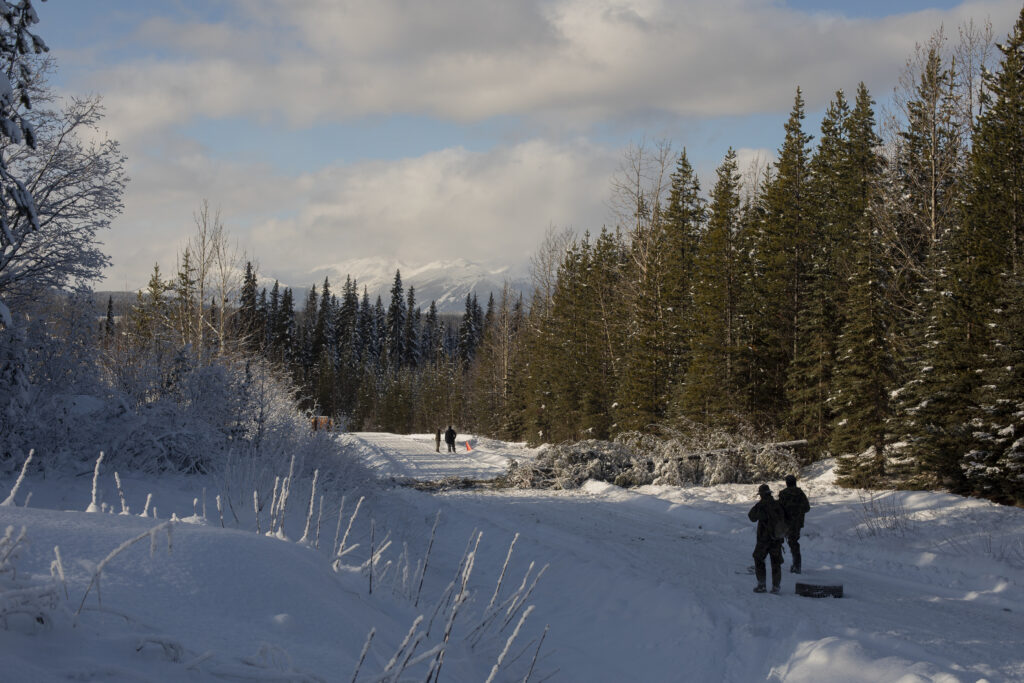
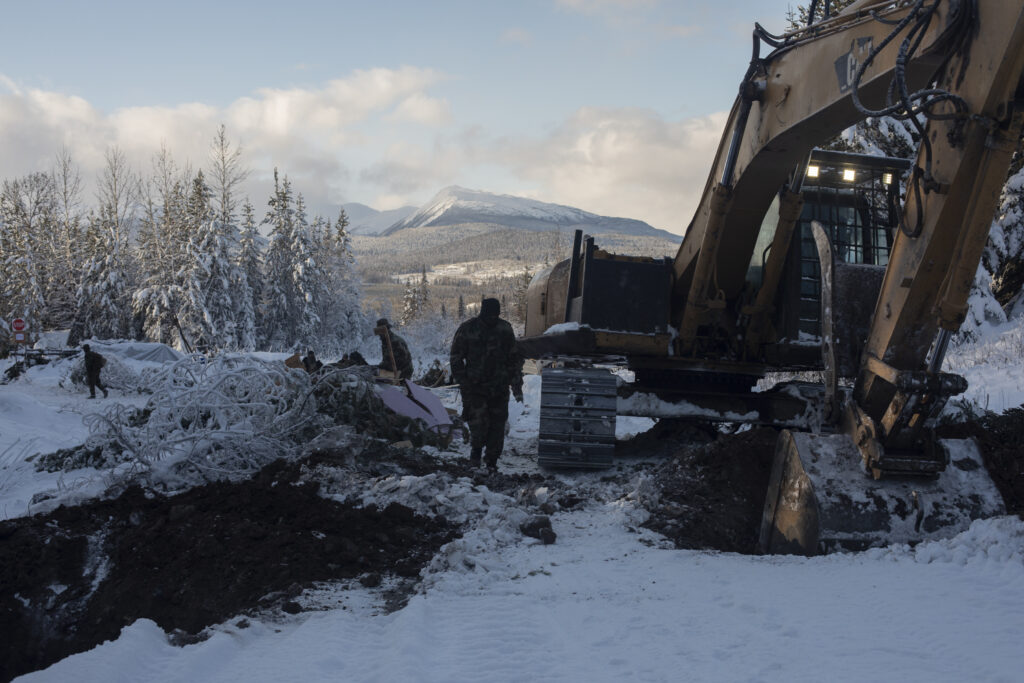
When the eviction order was first issued, RCMP officers arrested dozens of land defenders, including matriarchs, which led to solidarity actions across the country, including rail and port blockades.
Skyler Williams, a Mohawk Nation land defender who was involved in 2020 rail blockades on Haudenosaunee territory, said Indigenous people across the country are united in support for the Wet’suwet’en.
“It’s absolutely imperative that people start to understand if you’re not going to be respecting Indigenous Rights to our lands, whether it’s here, the streets of downtown Toronto or in the bush at Land Back Lane, our people are gonna stand together,” he told The Narwhal in an interview.
“Our perspective: we’re protecting the Morice River. We call it Wedzin Kwa, it’s a sacred headwater,” Woos said, his newborn child crying in the background. “Fresh mountain water flows, all these little creeks coming from the mountain flow into the Morice River. The Morice River goes into the Bulkley, and the Bulkley goes into the [Skeena] and it goes into the ocean. This is why we are so devastated and beside ourselves as to why this pipeline is going through such an incredible ecosystem.”
“Wet’suwet’en hereditary chiefs and our clans have full jurisdiction here,” Wickham said. “They have no right to be on our territory. They are trespassing, they are violating human rights. They’re violating Indigenous Rights and most importantly, they’re violating Wet’suwet’en law.”
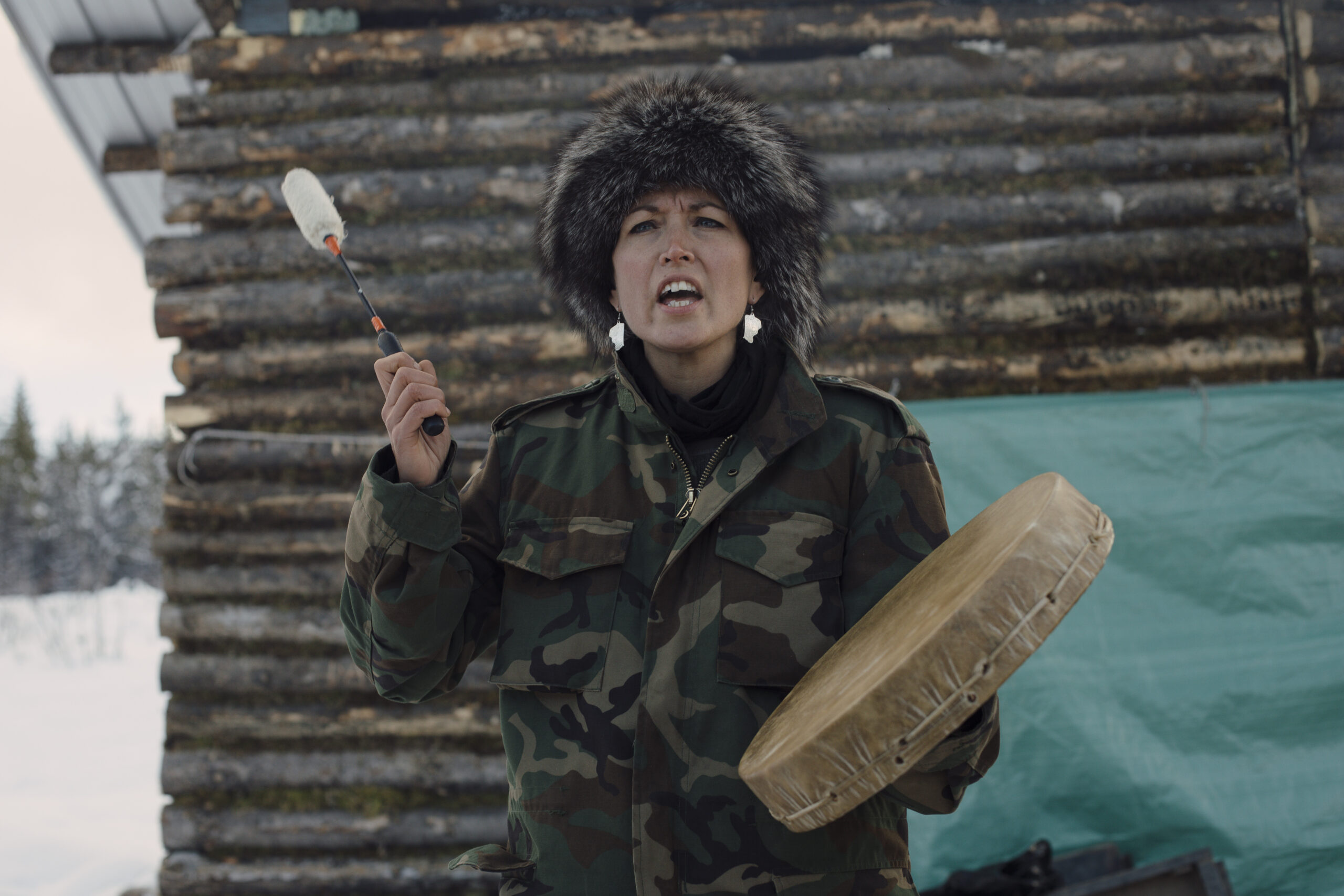
Woos explained that the details of why the Wet’suwet’en hereditary chiefs are taking this action have been obscured from the public.
“Since they started the project, and I’m referring to this pipeline, they never proceeded to contact the Wet’suwet’en hereditary chiefs,” he said. “They started instead to divide the Wet’suwet’en people through the benefit agreements and excluded the hereditary chiefs.”
The benefit agreements were provided to elected band councils in return for their approval of the project, which the province recently noted in a statement by B.C. Minister of Public Safety and solicitor general Mike Farnworth.
“Coastal GasLink has project agreements with all 20 elected chiefs and councils of the First Nations along the pipeline route,” Farnworth wrote. “The Province has also secured agreements with the vast majority of First Nations along the route.”
In a statement published to Coastal GasLink’s website on Nov. 18, the company said it has tried to engage in dialogue with the land defenders.
“Our top priority remains the safety of those in the area, including our workforce, contractors, and the Indigenous and non-Indigenous community members. Coastal GasLink’s preference is to always seek constructive dialogue and share information. Unfortunately, as protest group public statements made clear, the protest group at the Morice River had no interest in dialogue.”
Woos refuted the claim, noting the hereditary chiefs met with the president and vice-president of the company in the summer of 2020.
“They were attempting to start a dialogue with us,” he said in the video statement. “But there was something that was not right with the situation so we turned to the president and we said to him, before we start that dialogue, we need an apology in writing from you. And this apology should state the wrongs that they’ve done toward the Wet’suwet’en people, in particular the hereditary chiefs, by not consulting with them and not including them in the planning and the development of this pipeline from day one, and slandering the hereditary chiefs and misinforming the local people of Smithers, Telkwa, Houston, Hazleton, Terrace, Burns Lake, Prince George and making us look like we’re the bad people in this whole situation.”
“The hereditary chiefs agreed at that time that if this letter was given and was completed, it would start the process of dialogue,” Woos continued. “One year later, no letter, one year later, no reply from [Coastal GasLink]. This is what the local people need to know.”
“We’re asking again, in a diplomatic way, for [Prime Minister Justin] Trudeau to sit down with us, the hereditary chiefs, so that we can start a dialogue. So we can start discussions.”
Wickham said, in light of the arrests, there is an urgent need that supporters demand the government listen to the hereditary chiefs.
“We need everybody who’s an ally of Wet’suwet’en, of Haudenosaunee, a supporter of Indigenous Rights, a warrior of climate justice, to take action now,” she said in the video statement. “We need you to shut shit down everywhere that you can, to show this industry, this government and the world that they cannot do this to Indigenous people anymore.”
— With files from Amber Bracken
Get the inside scoop on The Narwhal’s environment and climate reporting by signing up for our free newsletter. When I visited my reserve, Moose Factory,...
Continue reading
The Conservative and Liberal parties diverge sharply on Indigenous issues. Here’s what that could mean...

After a series of cuts to the once gold-standard legislation, the Doug Ford government is...

The BC Greens say secrecy around BC Energy Regulator compliance and enforcement is ‘completely unacceptable’

